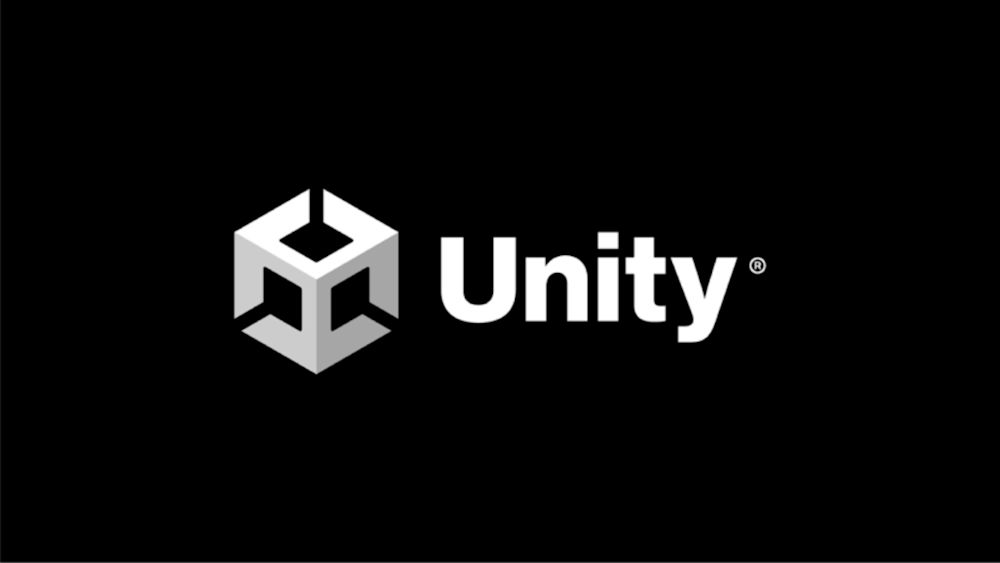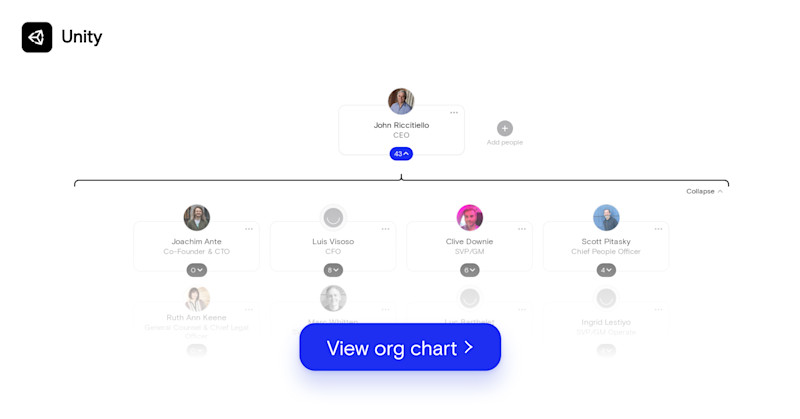With News Unity Technologies Is Going Public, The Org Looks into the Key Players Taking the Gaming Engine into its New Phase
Table of contents
After years of speculation around timing, San Francisco-based game engine and simulation company Unity Technologies has filed to go public. Meet the team that is seeking to democratize game development.

Looking outwards
Software built on Unity runs on more than 1.5 billion devices, the game engine has 1.5 million monthly active users and claims more than 53 percent of the top 1,000 mobile games on the Apple App Store and Google Play. In 2019, the company reported a loss of $163.2 million and revenue of $541.8 million, the latter being up 42 percent from 2018. So clearly, the company is becoming a dominating force in the powerful gaming industry.
Unity’s top competition comes from Epic Games’ Unreal Engine, on which Fortnite was created. But with Epic facing a momentous court battle with Apple over violations of App Store rules, Unity is now taking advantage of timing to reinforce itself with its IPO. 
Currently, the company’s biggest shareholders include Sequoia Capital, affiliates of Silver Lake Partners and J.A. Technologies. Plus Unity has invested heavily in R&D, with more than 56 percent of its workforce (or more than 1,800 employees) working in the field.
Democratizing the gaming world
Co-founders David Helgason, Nicholas Francis, and Joachim Ante started Unity Technologies in Denmark in 2004 with the aim to build a game. When that failed, they realized the tools they had created simplified game development and could be of serious value to other developers.
Seeking to ‚Äúdemocratize game development,‚ÄĚ the company derives revenue primarily through subscriptions to its services, used by game developers, artists, architects, automotive designers, filmmakers and others.¬† Through Unity, users can design, import and buy digital assets, such as forests, characters, sound effects and more, and then design how those assets interact with players. The engine runs games on just about any platform.
The team
In 2016, developer Niantic used Unity to build the global sensation Pok√©mon Go, leading Unity Technologies through several large funding rounds that ramped up its value. The stage of growth was overseen by CEO John Riccitiello. Riccitiello, who came on as CEO in 2014, has also seen Unity expand into other forms of entertainment‚ÄĒacquiring nine companies in 2019 alone.
Riccitiello will be responsible for keeping Unity Technologies in the fast lane for growth and development as the company pushes through the change in ownership and into the future.
Riccitiello joined Unity from Electronic Arts (EA), where he served as CEO from 2007, taking over the CEO role from Unity co-founder David Helgason. Helgason said Riccitiello was the right man for the role and a ‚Äúheartfelt believer in the indie scene and its importance to the overall well-being of the industry.‚ÄĚ
In a 2017 interview with Venture Beat, Riccitiello said Unity Technologies would stay on the forefront of a global shift to augmented reality products. 
SVP of AI Danny Lange will be fundamental to Unity’s success on the technology front.
Lange, formerly of Uber, Amazon, Microsoft, and IBM, has been bringing AI to gaming at Unity Technologies since 2015. At Uber, Lange built a machine learning team, at Amazon, he managed the internal machine learning platform and at Microsoft, Lange worked as principal development manager and architect on many of the company’s most successful machine learning programs. 
Another integral member is co-founder and CTO Joachim Ante, who wrote the first lines of code for Unity at high school and has stayed with the company ever since. Ante will be a key leader through the IPO and future growth of the company, anchoring Unity to its game development roots as it forges ahead into the broader entertainment and simulation world.
And finally, Unity CFO Kim Jabal, who joined Unity from Weebly, where she served as CFO and was responsible for selling the company to Square. 
Jabal will no doubt be instrumental in guiding the company and employees through the private-public transition--likely one of the most-anticipated in the gaming industry this season.
--
Sign up now:
In this article


The ¬‹ņÚ¬“¬◊ helps
you hire great
candidates
Free to use ‚Äď try today

